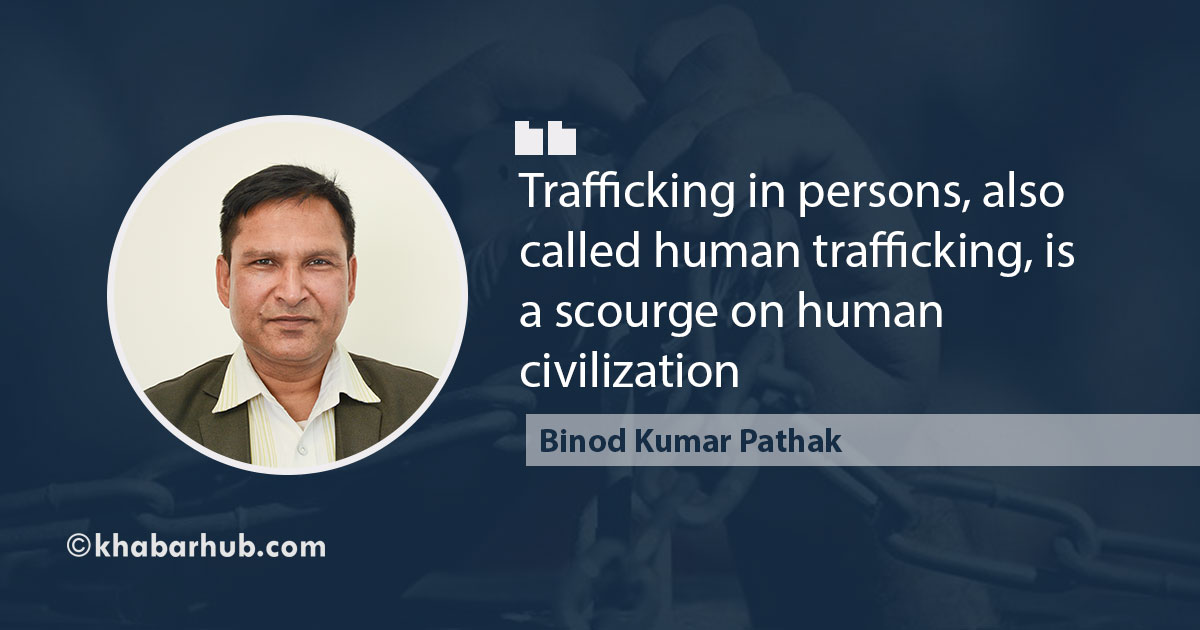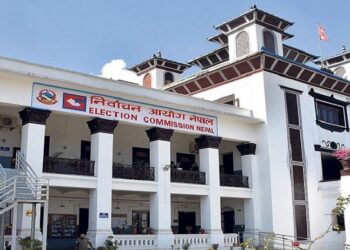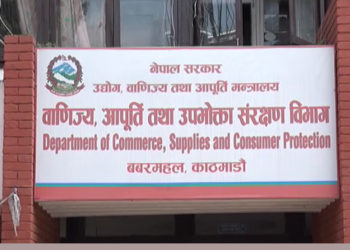KATHMANDU: 30 July is marked as World Day Against Trafficking in Persons as an annual event. In 2010, the UN General Assembly adopted the Global Plan of Action to Combat Trafficking in Persons.
The Plan calls for integrating the fight against human trafficking by boosting the field deployment of security worldwide. One of the crucial provisions in the Plan is the establishment of a UN Voluntary Trust Fund for Victims of Trafficking especially women and children.
The Trust Fund facilitates on-the-ground assistance and offers protection to victims of trafficking by giving grants to specialized NGOs working in this field. It aims to categorize victims of trafficking based on their backgrounds like armed conflict, civil war, natural disaster, crime, violence, sexual exploitation, and drug trafficking.
Trafficking in persons (also called human trafficking) is a scourge on human civilization. The UN General Assembly held a high-level meeting in 2013 to appraise the Global Plan of Action. The member states agreed to adopt a resolution on the subject to designate July 30 as World Day against Trafficking in Persons. Such a day is helpful to “raise awareness of the situation of victims of human trafficking for the promotion and protection of their rights.”
The UNODC (UN Office on Drugs and Crime) is focusing on highlighting the importance of government action this year (2019) to mark the World Day on July 30 in the best interest of victims of human trafficking. It is not only the governments worldwide, but the UNODC also encourages everyone to take action to prevent this heinous crime as human trafficking happens all around us.
Many countries have their own national trafficking laws legislated in line with the UN Trafficking in Persons Protocol. Nonetheless, this has not deterred the traffickers from committing the crime. With the power of money and illicit criminal nexus with politicians and law enforcing agencies, traffickers continue to commit the crime with impunity while victims are framed in forged criminal cases silencing them forever.
That is why UNODC is focusing on highlighting the importance of government action on the 2019 World Day against Trafficking in Persons. Sustainable Development Agenda for 2030 was adopted by the UN (United Nations) in 2015.
All the member-states especially developing and least developed countries are obliged to achieve a range of goals and meet the targets from across different areas highlighted in Sustainable Development Agenda mentioned above. Among them, goals and targets on trafficking in persons are of special significance today because they call for an end to trafficking and violence against children.
They also stress upon devising several measures against human trafficking and strive for the elimination of all forms of violence against (and exploitation of) women and girls. Article 3, paragraph (A) of the ‘Protocol to Prevent, Suppress and Punish Trafficking in Persons’ defines Trafficking in Persons as the recruitment, transportation, transfer, harboring or receipt of persons, by using threat, or force, abduction, fraud, deception, abuse of power or position, allurement of giving (or receiving) monetary payments or any kind of benefits with a view to gaining his/her consent wrongfully.
A person whose consent is so taken to move him/her from a usual place of residence with a malafide intention is considered as a victim of human trafficking. Human Trafficking is a crime where victims (- women, children, and men) are exploited against their free will in numerous ways including forced labor and sex.
It is modern-day slavery in which a victim is forced to indulge in prostitution of his/her own body or of others or any other form of sexual exploitation, forced labor and involuntary servitude or removal of organs for sale among others.
Every country in the world is affected by human trafficking, whether as a country of origin, transit, or destination for victims. Traffickers mostly target women, girls, and adolescent boys. Data collected from UNODC (in the year 2018) shows that the vast majority of detected victims of trafficking are subjected to commercial sexual exploitation and 35 percent of those trafficked for forced labor are female.
Human trafficking is a global problem and no country is immune to it. Millions of victims lured by fake promises and deceit suffer in the hands of traffickers. According to a conservative estimate by the ILO (International Labor Organization), around 2.6 million people mostly women and girls are currently in forced labor as a result of trafficking.
Human trafficking has created an under-hand black economy of not less than US$ 40 billion industry worldwide. Annually, approximately 600,000-800,000 people are trafficked across national borders around the world and 80 percent of them are women and girls.
Human trafficking in Nepal is a growing criminal industry. There are syndicates operating in this field to trap men, women, and children to traffic them to different countries across the world primarily across Asia and the Middle East for forced labor and prostitution.
Nepali victims of human trafficking need not cross the geographical boundary of the country as many of them are trafficked from rural to urban areas in cities like Kathmandu, Pokhara, Biratnagar, and even district headquarters. They are forced to act as prostitutes, sex slaves, domestic servants, drug traffickers, factory workers, mine workers, beggars, or street game performers, child soldiers (during Maoist conflicts or for specific political interest), crime facilitators and others.
Widespread poverty, high rate of illiteracy in rural areas, frequent disasters (mainly flood, landslides, and earthquake) are prominent reasons why Nepalese men, women, and children fall victims of human trafficking. Human traffickers take advantage of their state of vulnerability and catch them in their well-laid-out net.
Many numbers of Nepalese people, including children, whose home or livelihood was destroyed by the 2015-earthquakes were trapped by human traffickers in Nepal and many of them even today continue to be vulnerable to trafficking. Traffickers nowadays are smarter than police and use all the modern technologies of the mode of communication and transportation to move the victims from their original locality to other places.
These traffickers use social media and mobile technologies to lure and deceive their victims. A verified source of report says that as many as 305 complaints of human trafficking have been filed in different courts of law across the country alleging human trafficking in the fiscal year 2074/75 BS.
The number of plaints alleging human trafficking above is an all-time high in the last 6 years. In the fiscal year 2075/76 BS, as high as 195 complaints of human trafficking have been registered just in the first month of Baisakh (15 April -15 May).
Besides Nepal’s newly adopted constitution which specifically lists the right to equality and the right to freedom from exploitation, there are hosts of other laws which criminalize and forbid human trafficking. Some of these laws are Nepal’s Muluki Ain, Labor Act of 1992, the Human Trafficking Control Act of Nepal of 1986, Bonded Labor (Prohibition) Act of 2002, and the National Human Rights Commission Act of 1993.
Despite the provision of law stating that those found guilty would be sentenced up to 20 years in prison, human trafficking is an all-time high in Nepal in recent years. Nepal has also not adopted the international Palemo Protocol on Trafficking (2003).
Definitely, there are problems with enforcement of these laws. Rightly so, U.S. State Department’s Office to Monitor and Combat Trafficking in Persons placed Nepal in ”Tier 2” which means that Government of Nepal does not fully meet the minimum standards for the elimination of trafficking. Exactly, this is the reason why the UNODC is focusing on highlighting the importance of the government action on the World Day against Trafficking in Persons this year 2019.









Comment